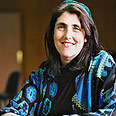
Dr. Einat Ramon
Zionism: A unifying movement within Judaism
Ahad Ha'am believed that intending Zionism to serve as a replacement for traditional Judaism, rather than as a creative extension of it, constituted a paradox that would erode Zionism from within
These days, as the topic of the rift within the Jewish people pervades the media (less so the street), it behooves us to recall the early days of Zionism.
The pioneers of secular Zionism perceived their movement to be a unifying force that created a common language for Jews of all ethnicities and beliefs. The modern nationalist drive was seen by most early Zionists as a tool; it offered an opportunity for rejuvenation and expression of the unity of the people.
Other nations that arose in recent centuries, such as the US, Canada and Australia, began as different groups of immigrants who shared no commonality, and who systematically eradicated ancient indigenous cultures.
In contrast, Zionism arose among different immigrant groups who were united by Judaism or by modern Jewish culture based on the Jewish religion. This unifying factor served as a vital tool in the rebirth of the people in its historical homeland.
This has been expounded by modern Jewish scholars Eliezer Schweid and Ehud Luz. The willingness to make painful compromises for the sake of a shared future was recognized as crucial by many secular Zionist thinkers, who demanded such compromises of themselves and of their followers, in the Land and in the Diaspora.
They understood that a complete secularization of the Jewish people and a rejection of Jewish tradition and lifestyle would mean cultural suicide and would empty Zionism of all meaning and content.
In this context, it is fitting to re-evaluate the philosophy of Ahad Ha’am as one that brought together Orthodox and secular Jews, and to understand his secularization of Jewish culture as an idea that joined rather than divided. Here he differed resolutely from the author Yosef Haim Brenner, striving for a different brand of secularization than did Brenner.
The latter, who was an important voice in the Labor movement, believed that the sum of the national Jewish movement was the revival of the Hebrew language, the workers’ settlements and a national framework that had no connection to Jewish culture.
Ahad Ha’am, on the other hand, presented a secular Jewish culture that sought to draw those farthest from Jewish tradition closer to their culture under the wings of the national Jewish movement without provoking a confrontation with Orthodoxy.
In “Torah from Zion,” he wrote:
“The truth is that our past is full of religious spirit that those of a liberal bent are incapable of absorbing. (…) With all their liberalness, they are enslaved to a hatred of religion that fills their heart.”
Increased study of Bible in secular system
Ahad Ha’am’s proposed solution to this hatred is to bring the freethinkers closer to religious content based on a nationalist approach. This would perforce bring in its wake an increased bond between religious and secular people. Thus, Ahad Ha’am pressed for increased study of Bible in the secular education system.
“The believer considers the Bible to be the Book of Books, a Divine revelation, whose truth cannot be measured by the tools of literary criticism (…) But neither does the non-believer, if he is a nationalist Jew, relate to the Bible solely as literature, but rather as a national literary treasure. (…) And there is no difference between him and the religious Jew except that the latter says, 'I believe,' and he says, 'I feel.' But one who is disconnected from his national past – who neither believes nor feels – by what right can he call himself a nationalist Jew? By virtue of the Hebrew language? (…) Why not abandon that as well, for he should certainly find another language, even more handsome than Hebrew!”
Ahad Ha’am here identifies a latent contradiction inherent in a Zionist identity that spurns any attachment to those Jews who choose to preserve the national soul through their old-fashioned faith.
He believed that intending Zionism to serve as a replacement for traditional Judaism, rather than as a creative extension of it, constituted a paradox that would erode Zionism from within. One hundred years later, even after the Holocaust and the establishment of the State of Israel, we are returning in this globalist age to the same discussion.
Let us conclude these historical contemplations with the appreciation of the verse “Happy is the people who know the sound of the shofar; they shall walk in the light of Your countenance.”
When we as a people are happy, when we are happy to have a share in the Jewish People and its different parts – then we will walk in the path of God’s countenance.
Dr. Einat Ramon is a lecturer in Jewish Thought and Women’s Studies at the Schechter Institute and founder of the Marpeh Program for Health-Care Chaplaincy which combines CPE (Clinical Pastoral Education) with a M.A. degree in Schechter’s Family and Community Studies M.A. track.










